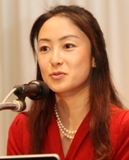Seeking Dignity of Everyone on the Earth - Challenges of an International NGO
April 7, 2010
Ms. Kanae Doi
Tokyo Director, Human Rights Watch
Lawyer
 �� Today, I will speak on the activities of an international non-governmental organization: Human Rights Watch. Human rights are the most basic rights endowed to human beings. Each state is obliged to respect human rights, as stipulated in the Universal Declaration of Human Rights and various other legal conventions. It is evident that we should all be free from slavery, torture, arrest and detention. Yet, when we look around the world, many states deprive their people of their basic rights. For example the Burmese government doesn��t allow more than 5 people to gather without permission, thus depriving their freedom of assembly.
�� Today, I will speak on the activities of an international non-governmental organization: Human Rights Watch. Human rights are the most basic rights endowed to human beings. Each state is obliged to respect human rights, as stipulated in the Universal Declaration of Human Rights and various other legal conventions. It is evident that we should all be free from slavery, torture, arrest and detention. Yet, when we look around the world, many states deprive their people of their basic rights. For example the Burmese government doesn��t allow more than 5 people to gather without permission, thus depriving their freedom of assembly.
��As a high school student, I was shocked to learn the plight of refugees when I read Ningen no Daichi (Land of People), a report written by Michiko Inukai on her visits to the refugee camps in Asia and Africa. Ever since I have been involved in saving refugees for nearly 20 years.
��About 15 years ago, Eritrea gained independence from Ethiopia. When I was a senior of university, I assisted them in establishing the framework of criminal law in this small country with a population of 3.5 million. Yet since 2001, Eritrea has turned into a dictatorship, forcing many of my friends studying law to flee from Eritrea and seek asylum. This experience made me realize that helping a country does not always lead to helping its people and we must safeguard individual human rights.
��I became an attorney in Japan in 2000, always being concerned about the refugee situation. The 9/11 terrorist attacks forced many Afghans to seek asylum in Japan. Even though most of them were the minority race Hazaras fleeing from the Taliban regime, they got arrested under the suspicion of links with Al Qaeda.
��In the late 1990s, only a few refugees were accepted in Japan each year. We worked to modify the overall refugee protection scheme and today, Japan has come to accept dozens of refugees every year from around the world.
��I have visited refugee camps repeatedly, quite unusual as an attorney. These experiences made me realize that refugee issues will never be solved unless regional conflicts or large-scale violations of human rights are rooted out. I decided to join Human Rights Watch during my studies in the US for my master��s degree, as I was deeply impressed by how they try to change the world. The headquarters of Human Rights Watch is located in New York. You might be more familiar with another leading international human rights NGO, Amnesty International, headquartered in London.
��Human Rights Watch conducts research on cases of human rights violation, often not reported in the media, and tries to influence governments around the world to eradicate the basic cause. We currently research human rights condition in 80-90 countries, with emphasis on the following key areas: business and human rights; protecting children��s rights; counterterrorism; eliminating racial discrimination; freedom of expression; religious discrimination; protecting human rights activists; women��s rights and prohibiting torture. My colleagues continue on-the-ground fact-finding every day, even facing dangerous conditions. Human Rights Watch shared in the Nobel Peace Prize in 1997, as a founding member of the International Campaign to Ban Landmines.
��When I was in New York, I felt the need to establish an office in Tokyo. Human Rights Watch also evaluated the Japanese government��s strong potential in solving various international issues. We worked hard and succeeded in establishing the Tokyo Office just recently in 2009.
����A video was shown which films the actual fact-finding activities on the Darfur crisis in Sudan. Human Rights Watch disclosed the plight of the Darfur conflict that occurred in 2003, leading to the resolution passed at the UN Security Council to deploy joint UN-AU PKO units in 2007 to protect citizens. ��
��The Darfur crisis is said to be the largest humanitarian crisis in the world, with nearly 300,000 killed according to UN estimates. Grave atrocities take place, while people in developed nations are kept ignorant. If we, the people in developed nations, make extensive survey on these issues and report through the media, governments can no longer turn a blind eye and will start taking measures towards solution.
��Human Rights Watch takes three steps to change the world. Firstly, we take the role of journalists, conducting surveys to identify human rights violations anywhere in the world and name those responsible. Secondly, we aim to bring perpetrators of the worst cases of war crimes against humanity to face justice at the International Criminal Court in the Hague, Netherlands and thus try to stop future massacres. Thirdly, we provide various information and political proposals to governments that value democracy, not only in Europe and America, but also in Asia like Japan and India, so that these governments will use diplomacy to promote human rights. Human Rights Watch is diligent in exposing human rights abuses and forces the international community and organizations into action.
��It is my sincere wish that you take a few moments to get interested in the current situations in other countries, consider and talk about them. This will make Japanese political leaders aware of human rights issues, and eventually lead to Japan playing a larger role in the international arena for solutions.